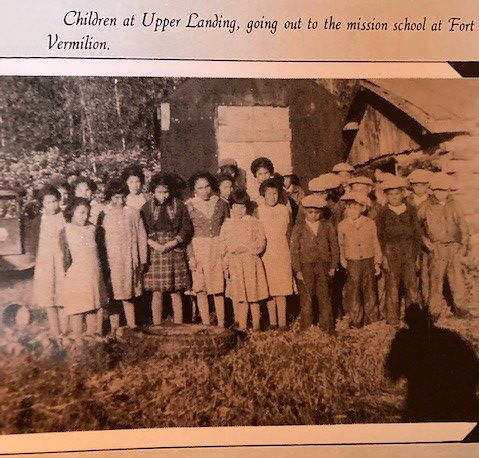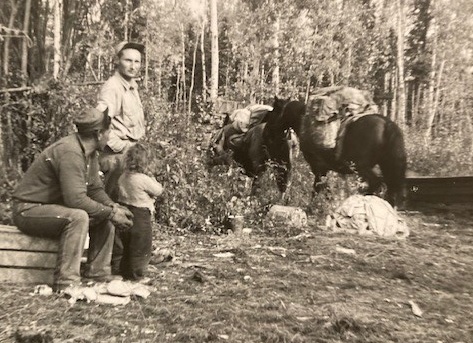It’s time to change our lens on Indigenous reconciliation and accelerate the healing process
Spruce boughs, tanned hide and the path to reconciliation
On Orange Shirt Day, Enbridge’s Dana Gray shares her family story
Tipis have become almost universally recognizable as part of Indigenous cultures across North America. For Dana Gray’s father Conrad and his ancestors, tipis are synonymous with home.
“The smell of spruce and tanned hide instantly takes me back to being a little girl at my grandparents’ home on the Little Red River Cree Nation on Treaty 8 Territory,” says Gray, an Edmonton-based advisor for Enbridge’s supply chain construction sourcing, recalling the tipis her family put up and took down for generations.
“The bottom of the tipi would be filled with spruce boughs and the structure would be covered in tanned hide,” she adds. “They were used as a home, for ceremonial gatherings, peace gatherings with other Tribes, spiritual and medicine use. Most importantly, the tipi was mobile and easy to set up as part of their nomadic way of life.”
It was a lifestyle Gray herself didn’t experience as a child, but one she’s had the chance to reconnect with over the last few years.
To commemorate Canada’s first National Day for Truth and Reconciliation on Sept. 30, previously and still commonly known as Orange Shirt Day, Gray and her father had planned to erect a tipi at Edmonton’s Enbridge Centre. Due to the fluidity of the ongoing COVID-19 situation and work-from home mandates in Alberta, the event has been postponed.
“The first time I ever put a tipi up was in 2019, and each time since then I become quite emotional doing this with my father,” says Gray.
“The emotion I feel is nostalgia, really. I miss those days with my grandparents and realized that I never appreciated how their lives were; I now know it was difficult for them, including my father, but they were strong and worked hard, and did their best to provide beautiful teachings about being First Nation. I was too young to hold on to all of it and am now re-learning to keep the culture going for my kids.”

Members of Dana's extended family among children who attended the former Fort Vermilion residential school in northern Alberta.
That connection to her heritage and ancestry is something Gray holds dear to her heart.
“I come from a line of hereditary chiefs who passed on the values of strong will and mind, and the importance of family and community support. I have no doubt that those values are what got my father, my Kokum (grandmother), my Mushum (grandfather) and many members of my extended family through their years at the residential school at Fort Vermilion.”
As part of the first generation to not attend a residential school, Gray was spared the direct experience, but certainly felt the impacts and the trauma. “We never really talked about it, but I always seemed to know that they went. I knew they were sad, scared and at times struggled in their adult lives from the years they were in there,” she recalls. “But we were not allowed to dwell. We had to push ourselves to be strong and successful in order to make our ancestors, especially the chiefs, proud.”

Dana's grandfather, looking at the camera, his daughter (Dana's aunt) and a friend with pack horses, circa 1960.
In thinking about what truth and reconciliation means leading up to Sept. 30, Gray talks of the need for acknowledging complete truth of our history as a precursor to reconciliation. “The finding of unmarked graves is a tragedy, and like the rest of Canada, I am sad for the children and their families that died at residential schools. Of course this news comes as no surprise for Indigenous people.”
She adds: “My hope is that these ongoing findings will bring closure to the families and will make the masses aware of and understand the truth of my people and what we experienced. And then, I invite people to find their own path of reconciliation. Wear an orange shirt on Sept. 30 and educate yourself on the injustices of the past, but also the ones that continue today.”
Dana says she is now proud of, and grateful for, her First Nations heritage and bloodline.
“I do not have to hide it,” she notes, “and yes, I truly did believe I had to hide it. I am relieved that the truth is being highlighted—it’s needed to start the conversation of reconciliation, even within my own family.”
At Enbridge, our employees are honoring National Day of Truth and Reconciliation in a number of ways—including virtual cultural events and discussions, trainings programs and more. We invite all members of our community to reflect on how we, as individuals, can make a difference and commit to action—if only to learn more and open our minds, our eyes and our hearts to the truth.
(TOP PHOTO: Dana Gray and her dad Conrad in front of a tipi they built at Edmonton's Enbridge Centre in 2019.)
You may also like
Actua’s home cultural kits for Indigenous students help spread STEM career awareness
University of Regina initiative supports the transition to campus life
Indigenous SCM student Connor McCallum excels in education, sport and community at Calgary’s SAIT Polytechnic
Enbridge sponsorships help Indigenous groups in Northwest Territories re-establish their connection to the land







